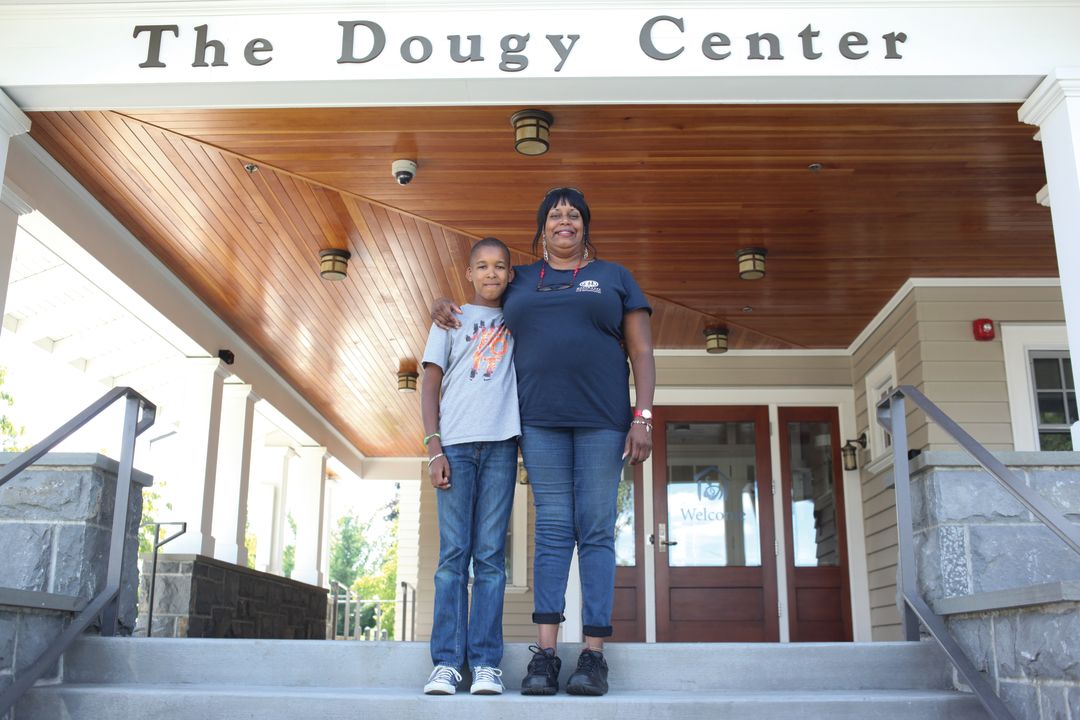
In August 1987, just three days after her 12th birthday, Brennan Wood suffered an unimaginable loss—her mother died from breast cancer. In search of an extra shoulder to lean on, the heartbroken soon-to-be seventh-grader was taken by her father to the Dougy Center for Grieving Children & Families. Three decades later, she runs the organization.
Now in her fifth year as executive director of the Portland-based nonprofit, Wood and her team support children and families grieving a death or advanced serious illness. To accomplish that goal, they provide direct grief support to more than 2,000 individuals each year and serve another 8,000 per year through trainings and community response initiatives. The Dougy Center also fields around 25,000 requests annually for referrals and for its printed materials, such as a tip sheet titled “Supporting Children and Teens When a Family Member Is Dying in a Hospital or Care Facility.”
The coronavirus pandemic and the circumstances around it have sparked even greater demand for the Dougy Center’s insights about dealing with grief and loss. To meet that need in the most relevant way possible, Wood and Co have produced additional material that includes recommendations specific to this stressful time.
As the pandemic in the US stretches into a fifth month, Wood spoke with Portland Monthly and shared advice for kids, parents, young single people, and seniors who are currently dealing with varying levels of grief, loss, and isolation.
Portland Monthly: When do we feel grief?
Brennan Wood: Grief happens when any loss occurs, but it can be important to distinguish between the grief we feel when someone we love dies or is diagnosed with an illness and the grief we feel when we can’t attend camp or play with our friends. What helps with grief, no matter the cause, is to acknowledge and validate.
So many people have lost a loved one during the pandemic. What advice would you give to a child—or really, anyone at any age—whose parent or grandparent has died due to COVID-19?
I’d say, having had my own mom die, I know this impacts every part of who you are. Hold onto your good memories of the person. Live your life with them in mind. Say their name. Share your stories about them. Continue to honor who they are—and who you are because of them. Know that there will be challenges that come with this, but it will get easier. There is an opportunity to make meaning and find growth and resilience through this process. I’d also tell them grief is natural, normal, and healthy. It’s OK to feel all of the emotions that come with this.
I think many of us want to say something to comfort someone we know who is struggling or has lost a loved one during the pandemic, but we don’t have your level of experience. We’re afraid we’ll say the wrong thing, or we’ll say it at the wrong time. What’s a good way for us to start the conversation? And what if it turns out they’re not ready to discuss it?
Bring up your uncertainty. Say to the person, “I don't know what to say, but I'm here to support you.” Even if they don’t want to talk about it yet, just opening the door to the conversation and letting them know you’re there to listen if they want to discuss it is helpful and important.

According to the Dougy Center, it is “common for children and teens to have an increased sense of fear and anxiety after a death” occurs. During the pandemic, kids are hearing about people dying due to the coronavirus every day. If they become increasingly afraid, how can a parent help them cope with that fear?
It’s helpful to normalize having nightmares and fears during this time. For example, parents and caregivers might say, “I also worry about Grandma. When I do, I take three deep breaths and look at my favorite picture of her. That helps me feel calm again.” Since some fears and worries are rooted in a lack of knowledge, you also can ask them if they have questions and then answer honestly, in language they can understand. Talking openly and honestly with your children about traumatic moments or tragic events creates a foundation of trust, enabling them to come to you in the future with their questions, fears, and concerns. Having a consistent daily routine can be helpful, too—establishing a sense of control in a situation that feels very out of control. It can also be helpful to remind children that there are things we can do to help keep ourselves and others safe, including washing our hands, wearing a mask, and keeping our distance.
What signs can a parent look for to determine the depth to which their child might be struggling inside due to the pandemic?
Grief can look different for everyone. Stomachaches, headaches, difficulty concentrating, anger, sadness, worry, confusion, needing extra hugs, wanting to be around you all the time, or acting out. These are all normal reactions to grief, but if you notice ongoing behaviors that interfere with your child’s daily life, seek the advice of a qualified mental health professional.
Many seniors feel so isolated right now. How can their kids and grandkids help them from a distance? And how can seniors combat their own feelings of loneliness and loss during the pandemic?
It can be helpful [for kids and grandkids] to schedule regular phone calls and video chats to check in, even if they are a quick five-minute connection. You can also surprise grandparents with letters, postcards, physically distant visits—wave from the street—and videos of family members saying hello or doing silly things.
It can help [seniors] to consider three categories: nourishing the body and brain, attending to thoughts and feelings, and taking a break from the intensity. Taking walks, taking deep breaths, eating nutritious food, and stretching are great ways to nourish the body and brain. Writing in a journal, talking with a trusted friend, and working with a therapist are constructive ways to attend to thoughts and feelings. Taking a break from the intensity can include ideas like reading books, listening to music, cleaning, and caring for a houseplant.
Many single young professionals have been experiencing an extensive amount of isolation, too—living alone in apartments and working from home. On top of that, given the pandemic’s impact on different industries, many of them are worried about their careers and the financial implications. What can they do to help themselves manage the weight of that isolation, stress, and grief?
I’d say the same ideas that I’ve been mentioning apply to single young professionals—especially the tips about attending to thoughts and feelings, taking a break from the intensity, and nourishing their body and brain, with an emphasis on ensuring they have a balance among those three categories.
"wood" - Google News
July 12, 2020 at 07:00PM
https://ift.tt/3fnig1Q
Dougy Center Director Brennan Wood on Coping With Grief, Loss, and Isolation During the Pandemic - Portland Monthly
"wood" - Google News
https://ift.tt/3du6D7I

No comments:
Post a Comment